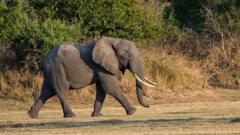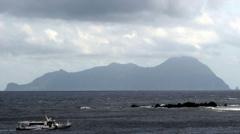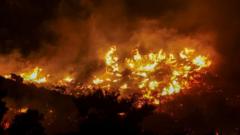**Kashmir's tourism sector struggles to regain footing as tensions rise and visitors remain apprehensive in the wake of a militant attack that claimed numerous lives.**
**Tourism in Pahalgam Faces Uncertain Future After Tragic Attack**

**Tourism in Pahalgam Faces Uncertain Future After Tragic Attack**
**As visitors cautiously return to Pahalgam following a deadly incident, the local economy grapples with escalating fears of instability.**
One week after a horrific terrorist assault near Pahalgam, a resort town in Indian-administered Kashmir, that left 26 people dead, the atmosphere in the area is marked by somberness and uncertainty. While a handful of tourists have returned, the once-bustling town remains largely subdued, with many shops still closed and hotels struggling to fill rooms.
The attack occurred last Tuesday when militants indiscriminately fired upon tourists visiting Baisaran, a picturesque meadow located about three miles from Pahalgam, often referred to as the "Switzerland of India." It was one of the most lethal attacks in recent memory, inflicting profound grief on families and igniting anger nationwide.
In the aftermath of the attack, tensions have escalated significantly between India and Pakistan, both of whom claim Kashmir but govern it in parts. Each side has begun implementing retaliatory measures, raising concerns over a potential military response from Delhi. In light of the security situation, regional authorities have shut down more than half of the tourist attractions in Kashmir as they conduct reviews and security operations.
Though violence has been a staple of the region since a rebellion began in 1989, brazen assaults on tourists are rare, sending shockwaves through the local economy mainly reliant on tourism. Local businesses fear the ongoing turmoil could lead to long-lasting damage caused by a sharp decline in visitors.
Akshay Solanki, a tourist from Mumbai, reflected on the initial panic his group felt during the attack but opted to stay since flights back were too costly. Other tourists noted the reassurance provided by local residents and security personnel as a source of comfort. However, local vendors like shawl-seller Rafi Ahmed have expressed concerns for their long-term livelihoods, having only made a few sales since the incident.
Boosting tourist numbers includes strong appeals from notable figures like Bollywood actor Atul Kulkarni, who visited shortly after the attack, encouraging people not to shy away from Pahalgam. He stated, "If the message from the militants is 'don't come here,' we should respond by coming in even larger numbers."
Despite minor signs of recovery, locals share a consensus that restoring a sense of normalcy may take a significant amount of time. The Indian government has embarked on extensive combing operations, resulting in the detention of several hundred individuals and the demolition of homes associated with alleged militants.
In addition, India and Pakistan have exchanged fire across their borders, further exacerbating fears for the wellbeing of both tourists and local businesses. The surge in violence raises major questions about the future of Kashmir's economy, previously touted for its potential growth under a revitalized tourism sector.
Indian leaders heralded a period of relative peace following the revocation of Kashmir's autonomous status in 2019. As the impending 2024 elections approach, Prime Minister Narendra Modi has pointed to high tourism numbers as evidence of this development. Yet the recent attack has derailed the narrative, leaving sentiments of insecurity and distrust in its wake.
Rafi Ahmed Meer, a local politician, articulated the deep concern stemming from the attack, emphasizing the urgent need to rebuild trust among tourists and reaffirm that local citizens came together to assist in the immediate aftermath. Travel cancellations from cities across India have surged, prompting fears that tourist numbers may take years to recover.
The attack's ripple effects extend beyond tourism. The opening of a highly anticipated railway bridge connecting Kashmir to the rest of India has now been thrown into uncertainty, undermining investment opportunities and regional development.
Kashmiri leaders have expressed profound sympathy for the victims' families. In a heartfelt address in the Jammu and Kashmir assembly, Chief Minister Omar Abdullah lamented the senseless loss of life and emphasized the shared trauma felt by individuals throughout the country who traveled to Kashmir seeking its beauty and hospitality.
The attack occurred last Tuesday when militants indiscriminately fired upon tourists visiting Baisaran, a picturesque meadow located about three miles from Pahalgam, often referred to as the "Switzerland of India." It was one of the most lethal attacks in recent memory, inflicting profound grief on families and igniting anger nationwide.
In the aftermath of the attack, tensions have escalated significantly between India and Pakistan, both of whom claim Kashmir but govern it in parts. Each side has begun implementing retaliatory measures, raising concerns over a potential military response from Delhi. In light of the security situation, regional authorities have shut down more than half of the tourist attractions in Kashmir as they conduct reviews and security operations.
Though violence has been a staple of the region since a rebellion began in 1989, brazen assaults on tourists are rare, sending shockwaves through the local economy mainly reliant on tourism. Local businesses fear the ongoing turmoil could lead to long-lasting damage caused by a sharp decline in visitors.
Akshay Solanki, a tourist from Mumbai, reflected on the initial panic his group felt during the attack but opted to stay since flights back were too costly. Other tourists noted the reassurance provided by local residents and security personnel as a source of comfort. However, local vendors like shawl-seller Rafi Ahmed have expressed concerns for their long-term livelihoods, having only made a few sales since the incident.
Boosting tourist numbers includes strong appeals from notable figures like Bollywood actor Atul Kulkarni, who visited shortly after the attack, encouraging people not to shy away from Pahalgam. He stated, "If the message from the militants is 'don't come here,' we should respond by coming in even larger numbers."
Despite minor signs of recovery, locals share a consensus that restoring a sense of normalcy may take a significant amount of time. The Indian government has embarked on extensive combing operations, resulting in the detention of several hundred individuals and the demolition of homes associated with alleged militants.
In addition, India and Pakistan have exchanged fire across their borders, further exacerbating fears for the wellbeing of both tourists and local businesses. The surge in violence raises major questions about the future of Kashmir's economy, previously touted for its potential growth under a revitalized tourism sector.
Indian leaders heralded a period of relative peace following the revocation of Kashmir's autonomous status in 2019. As the impending 2024 elections approach, Prime Minister Narendra Modi has pointed to high tourism numbers as evidence of this development. Yet the recent attack has derailed the narrative, leaving sentiments of insecurity and distrust in its wake.
Rafi Ahmed Meer, a local politician, articulated the deep concern stemming from the attack, emphasizing the urgent need to rebuild trust among tourists and reaffirm that local citizens came together to assist in the immediate aftermath. Travel cancellations from cities across India have surged, prompting fears that tourist numbers may take years to recover.
The attack's ripple effects extend beyond tourism. The opening of a highly anticipated railway bridge connecting Kashmir to the rest of India has now been thrown into uncertainty, undermining investment opportunities and regional development.
Kashmiri leaders have expressed profound sympathy for the victims' families. In a heartfelt address in the Jammu and Kashmir assembly, Chief Minister Omar Abdullah lamented the senseless loss of life and emphasized the shared trauma felt by individuals throughout the country who traveled to Kashmir seeking its beauty and hospitality.






















